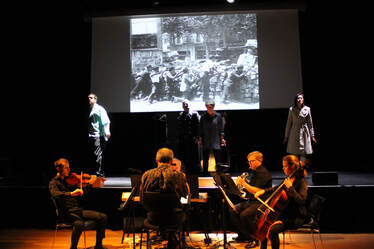|
I went to see Music Theatre Wales' production of The Golden Dragon in Basingstoke recently. This is a production which has caused some controversy because of its ‘yellowface’ casting. http://musictheatre.wales/news/hackney-empire-cancels-music-theatre-wales-production-of-the-golden-dragon As one of those who vaguely remember the role of the Lord Chamberlain and, subsequently, Mary Whitehouse, I reject censorship of any kind and would defend the right of any artist to show anything on stage regardless of its reception by any part of the community. That seems to me to be an over-riding principle. If pressure groups or individuals succeed in blocking something that’s not to their taste - that’s censorship. This isn’t real politics here - it’s the stage. Dissenters' voices can be heard, certainly, but they must be tolerant. Audiences can vote with their feet. However, the problem here seems to have been exacerbated by the fact that MTW tried to capitalise on their contention that the work was political, and that it addressed certain issues. By proclaiming it was an opera in which ‘East meets West’, they had it coming to them. Most definitely, West met West. The Golden Dragon clearly required opera singers with the particular skill sets that these artists train for, and, in this case, more besides. MTW might have tried harder to find artists of Asian extraction, and there are certainly some around, but I fear it would have been difficult to have cast the entire show in this way. Artists often collaborate with other artists they know: partnerships over time have a cumulative effect. This is a free society (or should be) and artists should be free to work with whomsoever they wish. Supposing they had got 5 singers together with the ‘required’ ethnicity? Would the orchestra have also needed to be BAME? There were gongs and other effects that sounded vaguely Chinese from time to time: was that cultural appropriation? And if it was, so what? We live on the same planet and should ignore race, creed and gender in favour of our common humanity. Actors can, and should, empathise with the folk of any continent in any era. You don’t need a Norseman to portray Beowulf. Yet, of course, one hopes for increased diversity in the profession in due course. The training of singers takes many years and the length of that training and the subsequent hardships endured in the gaining of experience hardly favour students from less well-off backgrounds. There’s often a major financial investment from students or their families into the training of classical musicians. By causing the cancellation of performances in multi-cultural areas of the country, (The Golden Dragon was cancelled by the Hackney Empire) new audiences would be deprived of the chance of seeing new opera and it is such opportunities that stand the best chance of inspiring young people to train for the profession in the first place. So Hackney has missed out. How to speed up increased diversity in the opera world is another question which I don't know the answer to, though I expect money is an important factor. That begs the question of why MTW programmed The Golden Dragon in the first place. It certainly has received a waft of excellent reviews and has even been well-received in the Far East. I remember Eôtvôs’ music from the 1970s when I was an apprentice in Germany. I found this, more recent music of his reminiscent of a modernistic, ‘Darmstadt’ sound-world, with some added onomatopoeia in the style of early Ligeti. But music has moved on, and new audiences might have been more successfully grown on this important and, doubtless, heavily-subsidised UK tour by a work that was more accessible. The Golden Dragon was an odd choice. The dated music matched the dated scenario. We remember the Morecambe Bay cockling disaster (2004) and the Chinese gang masters acting for international criminal networks who imported the slaves who died working for them. But that wasn’t the stuff of The Golden Dragon which, with its cartoon humour, only succeeded in trivialising the issues. Even the Boy’s death was flimsy, caused as it was by a tooth extraction, though it was movingly sung. Had the work showed exploitation, had we witnessed some thuggery or other evil at work, it might have been more relevant to our times rather than sitting uncomfortably on the border line between fable and caricature. See the Guardian review: www.theguardian.com/music/2017/oct/08/the-golden-dragon-review-opera-passion-power-politics-v-and-a
0 Comments
Leave a Reply. |
Edward LambertComposer and musician Categories
All
Archives
July 2024
|
|
Scores available by means of a Performance Restricted license from IMSLP
The Music Troupe
|
Contact Us |
 RSS Feed
RSS Feed
